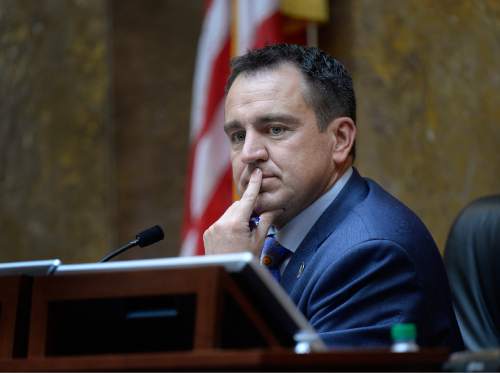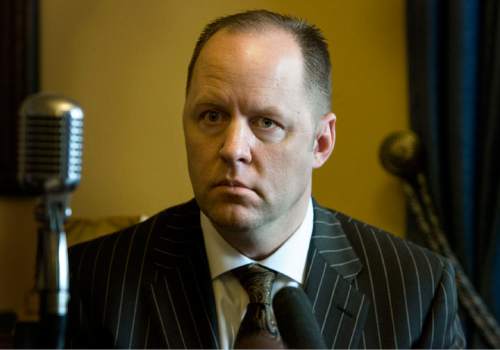This is an archived article that was published on sltrib.com in 2016, and information in the article may be outdated. It is provided only for personal research purposes and may not be reprinted.
Utah House Speaker Greg Hughes said Thursday that he has decided to replace his sole appointee to the Utah Transit Authority Board — but insists it has nothing to do with a controversial trip to Switzerland that Hughes organized and the appointee participated in.
Hughes said he will replace Sheldon Killpack, a former Utah Senate majority leader, with Babs De Lay. She is a Democrat who is a longtime gay rights leader and real estate agent who just made an unsuccessful run for the Salt Lake City Council.
Hughes — former chairman of the UTA board — said, as he has previously, that he started thinking about making the switch in October, long before controversy arose over the now much-publicized Swiss trip.
He had originally appointed Killpack as someone who might help with long-range strategic planning, Hughes said, including building new mountain transportation and other rail systems. "That's the sort of thing I focused on when I was on the board."
But when Proposition 1 to raise sales taxes for transportation appeared to be in trouble in Salt Lake County, he said, "I thought that maybe an appointee who would look at some of the nuts and bolts issues of UTA," such as restoring more bus service, "is more what should be the focus right now" to help build public trust in the agency.
De Lay has the background to do that, and has agreed to serve on the board, said Hughes.
"My friendship with Babs predates my entrance into politics," Hughes said, explaining why a Republican leader might appoint a liberal Democrat. "I thought she would be a good eye and a good voice for the board."
The Utah Transit Riders Union, a group that advocates for transit riders, issued a statement welcoming De Lay to the board, but questioning whether a realtor is really needed there.
"With the result of Prop 1, it is clear that the public expects more accountability from UTA and less focus on real estate, which is already overrepresented on UTA's board," the group said. "With the nod to Babs, unfortunately it seems as if UTA continues to be out of touch with the needs of the average rider."
Alex Cragun, vice president of the group, added, "Overall, we'd like to see more consumers, not benefactors, on the board of UTA. A balance between the needs of consumers and the demands of industry is needed to keep UTA on track."
Killpack's term technically does not end until April 2019, but he previously told The Tribune that he would step down if Hughes requested. Killpack and De Lay could not be reached immediately for comment on Thursday.
The 16 members of the UTA board are appointed by different groups, including one each by Hughes, the governor and Senate president, and others by different groups of cities and counties.
Killpack was among three UTA board members involved in a trip to Switzerland in September to visit Stadler Rail, which has since decided to start some temporary rail-car manufacturing operations in Utah.
They also visited a variety of mountain transportation systems, which Hughes said Utah someday may want to copy.
This trip came as Stadler was bidding to use part of a UTA facility for its manufacturing. UTA had to stop that bidding process for a time because of the Swiss visit, but later reinstated it after ensuring Killpack and UTA board Vice Chairman Chris Bleak would not be part of the decision-making process.
This Swiss trip used private funding, including from a political action committee financed by UTA contractors, that avoided public disclosure until after the election on Proposition 1.
Shortly after the trip was disclosed, Bleak resigned from the board.
He said that was unrelated to the Swiss trip, and occurred in order to avoid conflicts of interest because of a new project by one of his clients in his lobbying business.





